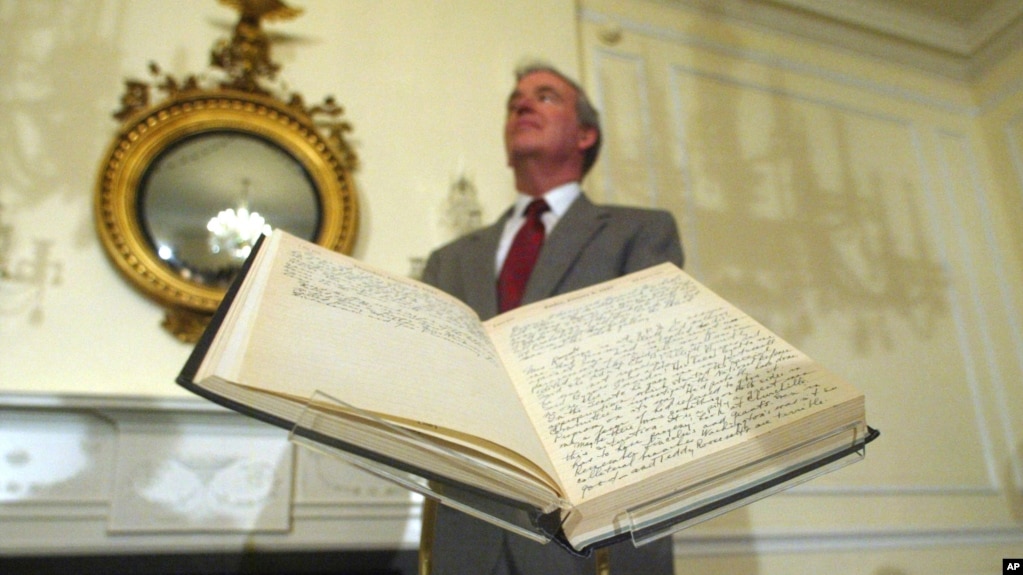AUDIO
Secrets of US Presidential Diaries

One early morning in Washington, D.C., many years ago, the president of the United States took off his clothes and jumped into the Potomac river. Moments later, he saw a dead man float to the surface.
The president was John Quincy Adams, the nation’s sixth leader. And we know about the incident because he wrote about it in his diary.
A diary is a daily record of events of one’s life, especially of personal experiences and thoughts.
American presidents from George Washington to Joe Biden, have been known to keep diaries. The men wrote about everyday experiences and thoughts. They also wrote about important decisions they made and the reasoning behind such decisions.
Adams called his diary his “second conscience.” Barack Obama said his diary is a process of turning thoughts into writing that “makes you ask tougher questions.”
Jimmy Carter left the White House with more than 5,000 pages of such notes. He said, “I seldom exercised any restraint on what I dictated.”
Dwight Eisenhower wrote about disputes within a scientific advisory group and some of its proposals about Soviet atomic bombs. And Donald Trump’s daily writing was seen by the public on Twitter, now known as X.
FILE - A portion of a page from a Harry Truman's 1947 presidential diary is shown at the National Archives in Washington, July 10, 2003. (AP Photo/Rick Bowmer)
Secrets in diaries
Sometimes, the presidential diaries contain secrets that they should not.
Robert Hur was the special counsel who investigated Biden’s handling of classified information after his time serving as vice president. He reported that Biden’s diary contained notes from intelligence briefings, including some classified as “top secret.”
The 1978 Presidential Records Act says that the U.S. government has “complete ownership, possession, and control” of all presidential and vice presidential records. The act does not cover personal diaries. But classified information is not supposed to be in those.
Hur noted in his report that both Jimmy Carter and George H.W. Bush had classified information in their diaries.
Ronald Reagan left the White House in 1989. He took with him eight years of handwritten diaries, the report says, “which he appears to have kept at his California home even though they contained Top Secret information.”
Hur wrote, “Historically, after leaving office, many former presidents and vice presidents have knowingly taken home sensitive materials related to national security from their administrations without being charged with crimes.”
Both Biden and former President Donald Trump have been investigated for their handling of classified information. But only Trump is being accused of resisting demands to return them.
FILE - Nancy Reagan, front left, place some of former President Ronald Reagan's original diaries on display at the Ronald Reagan Presidential Library May 21, 2007, in Simi Valley, California. (Eric Parsons/The Ventura County Star via AP)
Values of diaries
Students of history have always been interested in presidential diaries.
They “provide unique windows into the presidency, helping us better understand how policy is made and power is used,” said Marc Selverstone, director of Presidential Studies at the University of Virginia’s Miller Center.
As for John Quincy Adams, all 15,000 pages of his diaries written over 68 years are available to the public. The Massachusetts Historical Society, which publishes them online, said his diaries represent “the longest continuous record of any American of the time.”
On July 22, 1825, Adams wrote, “I stripped and went in to the river; I had been not more than ten minutes swimming when the drag boat started, and they were not five minutes from the shore when the body floated immediately opposite the rock; less than one hundred yards from the shore.”
The entry noted the death of Mr. Shoemaker, a post office worker seen swimming about in the water earlier.
Words in This Story
conscience – n. knowledge of right and wrong and a feeling one should do what is right
tough – adj. difficult to accomplish, resolve, endure, or deal with
dictate – v. to speak or read for a person to transcribe or for a machine to record
counsel – n. a lawyer engaged in the trial or management of a case in court
classified – adj. withheld from general circulation for reasons of national security
unique – adj. being the only one of its kind
strip – v. to remove clothing, covering, or surface matter from
shore – n. land along a body of water
https://learningenglish.voanews.com/a/secrets-of-us-presidential-diaries/7529458.html